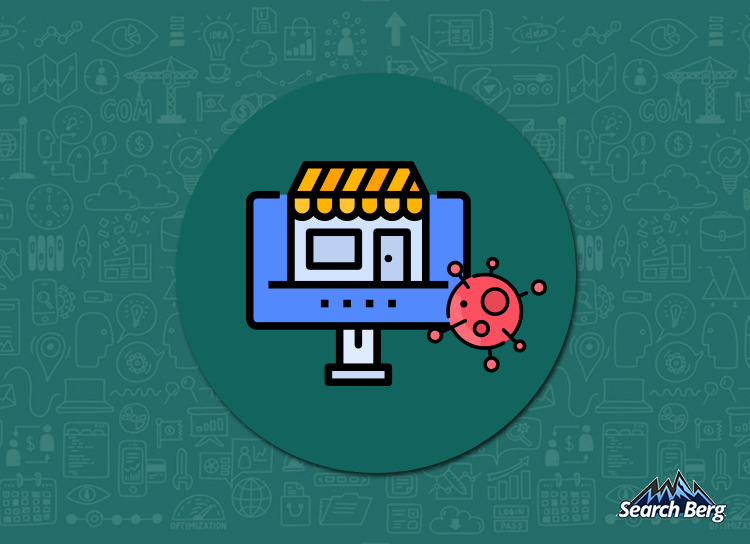8 Reasons to Protect Your Brand’s Online Reputation During the COVID-19 Pandemic

As the ongoing COVID-19 pandemic continues, businesses have been adopting digitalization in droves to maintain high-level KPIs and metrics, ensure audience engagement and retention, and reduce customer attrition rates.
Not only has the lockdown vitiated local offline businesses, but it has also impacted the performance of online businesses with weak or nonexistent SEO practices.
According to the United Nations, COVID-19 has impacted over 482 million workers in the retail and wholesale industries, 463 million workers in the manufacturing industry, and over 157 million workers in the business services and administration sectors.
While many brands across the U.S. have digitalized their business by adopting strong online selling and marketing strategies, the large majority is still struggling to navigate this complex and foreign transition. Despite the astounding 50% increase in digital sales, over 51% of Americans admitted to delaying digital adoption despite its exigency.
In addition, brands that are new to digital marketing are struggling to familiarize themselves with—and consequently utilize—indispensable marketing tools and best practices like social media management, content marketing, web design and development, and online reputation management.
The fact is, though, that those brands which are learning how to manage and improve their online reputation effectively are performing far better, even during COVID 19.
It is thus integral to monitor one’s brand reputation because it helps in maintaining, increasing, and enhancing brand visibility and perception, customer reach, sales revenue, and net profit margins during this ongoing period of rapid flux and uncertainty.
What Is Reputation Management and Why Does It Matter?

As online brand presence emerges at the forefront of establishing strong customer relationships and ensuring successful sales, reputation management has become a vital tool that brands can’t afford to sideline.
Reputation management services are designed to help businesses detect, process, and effectively respond to negative allegations and damaging misinformation.
Let’s circle back to why this is crucial during the ongoing crisis. Over the past few weeks, COVID-19 has caused:
- A 20% increase in social media usage
- A 40%+ increase in Facebook usage
- A 22% increase in Instagram usage
- A 23% increase in Twitter usage
- A 15%+ increase in YouTube usage

For instance:

Leaving reviews that could negatively impact brand identity unaddressed not only leaves customers dissatisfied but also results in more people expressing their discontent. As people engage with the review, they’re also more likely to form a negative opinion about the brand, thereby feeling less inclined to invest in their products/services in the future.
However, timely detection and a tactful response by the brand can undo a lot of potential damage.
For instance, Apple’s assiduous and prompt response resulted in the customer following up their tweet with:

While the aforementioned interaction is a great way to strengthen brand identity and appease customers, most brands remain in the dark about negative reviews, thereby running the risk of damaging brand reputation.
This is where reputation management services step in.
By conscientiously examining a brand’s digital presence, reputation repair experts ensure timely remedial action. As a fundamental component of reputation management, social media monitoring increases conversion rates, audience retention, revenue growth, net promoter score, website traffic, and customer satisfaction.
Still skeptical about leveraging reputation management to boost your business?
We’ve rounded up eight reasons to benefit from reputation management services during the ongoing COVID-19 pandemic.
1. Reduce Customer Attrition
According to Forbes, over 97% of business owners across the U.S. attribute their strong brand presence to active reputation management. The reason? Reduced customer attrition.
With social media usage expected to hit an all-time high in the following months, people are increasingly sharing reviews on personal and professional platforms such as Facebook, Instagram, Twitter, Snapchat, LinkedIn, and Google My Business. Messaging platforms like WhatsApp and Facebook Messenger have also increased in popularity owing to the ongoing lockdown.
The consequent increase in negative reviews, false allegations, and factually inaccurate information can increase customer attrition rates, thereby affecting sales and diminishing brand credibility.
Reputation repair and management services play a fundamental role in improving brand perception by suppressing damaging and unfavorable content, thereby preventing customers from seeking competitors instead.
By concurrently utilizing response and removal strategies, reputation management services also help brands reduce the chances of an expansive digital altercation that could potentially attract attention for undesirable reasons.
Response strategies focus on crafting an empathetic, apologetic, and remedial response to the customer’s concerns.

Nike’s timely response—within the same day—is a great example of a strong reputation management response strategy. Instead of drafting an objectively remedial response, they engage with the customer subjectively, thereby establishing a virtual connection.
Not only does this rectify the customer’s concerns, but it gives potential customers a glimpse of the brand’s empathetic and prompt engagement.
While many brands tend to conflate customer service with reputation management, the latter undertakes an exhaustive and all-encompassing digital search to identify negative reviews on:
- Social networks (Twitter, et al.)
- Search engines (Google, et al.)
- Review sites (Google My Business, Yelp, et al.)
- Online video-sharing platforms (YouTube, et al.)
The methodical comprehensiveness ensures maximum engagement, thereby generating a positive brand reputation.

Collectively, these measures minimize customer attrition at the height of digital interaction.
2. Build Customer Trust, Credibility, and Loyalty during a Period of Uncertainty and Anxiety
The COVID-19 pandemic has gripped people with fear, anxiety, uncertainty, and an overwhelming sense of hopelessness. As the situation continues to deteriorate across the nation, people are actively seeking support, motivation, and encouragement from friends, family, and brands.

Trusted brands have some key traits, including:
- Empathy – They even go as far as rather than having an us vs. them approach, they adopt the opposite: an us = them approach. Because of this approach on the brand’s part, customers find it easy to think of themselves as aligned with the values and priorities of a company.
- Transparency – This consists not only of sharing information accurately and in the right amount but also phrasing said messages in an appropriate manner for the subject matter.
- They connect through shared values – Shared values indicate a level of consistency in the brand’s approach. The content may change, the pandemic may evolve, and time may bring new challenges every passing day, but the morals of the company will stay consistent. This consistency builds trust with a customer.
When trust is in this way built at the highest of levels between the customer and the brand, there are strong emotions tied to the customer’s investment into the company.
Lending your support by engaging with not-so-great reviews and comments in a friendly and empathetic manner will help customers feel positive and affirmed during a period of increasing chaos.
Building customer trust, credibility, and loyalty will also strengthen your brand identity.
3. Boost Digital Lead Generation (and Sales!)
Struggling to generate more leads for your business amid the ongoing pandemic?
You can boost your lead generation efforts using reputation management. Since reputation management allows you to stay in the loop on what conversations are being had about your brand on social media, use this knowledge.
Using active social listening, you can identify:
- People that are seeking product/service recommendations akin to what you are offering. Then, very simply, recommend your product to them in a way that shows them it meets their needs.
- Unsatisfied customers who have used your competitor’s product/service. If you’re aware that your product instead can actually help them, directly engage with them in conversation and tell them why. You can also share a useful blog post you made that helps them with their specific or even a lead magnet with good information, which would lead them into your sales funnel.
- People who are intrigued by your product or service specifically. Finding consumer questions and inquiries as soon as they appear on the internet and responding to them helps you provide a very streamlined and high-quality customer experience, both for potential and current customers. This service incentivizes them to go on to or to continue using your product or service.
- Relevant influencers who can help you attract more customers. Many are surprised that it’s not necessarily the biggest influencer that can help your brand but the one with the most relevance to your product/service. By interacting with such influencers, not only do you discover them but also figure out how you can work together to promote your brand.
Reputation management companies also offer SEO services, paid search marketing, and social media marketing, thereby maximizing lead generation. As your Google rankings are improved, you’ll notice an increase in customer attraction, engagement, and retention.
While most businesses initially consult reputation management services to strengthen their online presence, this synchronous benefit ends up ensuring long-term holistic business growth.
4. Improve Search Engine Rankings
Online reviews play a significant role in SEO.
SEO reputation management strategies—including link development, researching appropriate link partners, and running branded PPC ads, among others—increase SEO visibility.
This enhances customer experience and increases sales, especially during a period when most brands are struggling to maintain KPIs.
5. Understand Evolving Customer Needs and Expectations

COVID-19 has caused a massive shift in customer needs and expectations. While brands were previously focused on engaging with audiences through their products and services, there has been an increase in the need to establish customer relations by lending support during the ongoing crisis.
Instead of circling back to marketing and selling, more and more businesses are helping customers feel acknowledged and validated as the lockdown, and consequent fear surrounding COVID-19 continue.
Utilizing reputation management tools is a great way to establish meaningful connections with customers, thereby understanding their evolving needs and expectations. For instance, most travel businesses understand that their customers aren’t seeking their services at the moment.
However, this shouldn’t halt customer communication in the least. Instead, reorienting strategies in accordance with the changes helps customers feel comforted, thereby increasing the likelihood of a positive customer-business relationship in the future.
Reputation management services play a foundational role in responding to negative and positive feedback alike, thereby cultivating a genuine connection with the customer that goes beyond a temporary transaction.
6. Develop an Empathetic, Responsible, and Crisis-Sensitive Digital Customer Communication Strategy
While some brands have struck a fine balance between retaining metrics and engaging with customers in a responsible manner, there are many others that are struggling to traverse this tricky terrain.
While you may feel tempted to give in to a company’s capitalist roots and create solely promotional and/or sales-y content, you might want to reevaluate this decision.
The COVID 19 crisis demands that we move away from unadulterated branding and instead prioritize a more empathetic, human tone to brand messaging.
Providing helpful and supportive messages can… well, help an audience feel supported! Especially in this time of immense uncertainty and chaos.
Try to remember, people’s lives have been turned upside down. So they might view an overly promotional post as downright insensitive of a brand.
Change your messaging to reflect this shift towards a more “humanized marketing approach,” centering on the health of your audience. Showing that you care about holistically supporting your audience’s physical, social and mental health will place you as a thought leader and will ultimately serve to help build wider trust with your brand.
If you’re unsure about how to draft an effective and crisis-sensitive digital customer communication strategy, it may be best to consult professionals. Responding to customers in an unsupportive and dismissive manner can cause long-term damage to your brand’s reputation, especially given the sensitivity of the ongoing pandemic.
7. Strengthen Brand Visibility and Identity
One of the most favorable benefits of protecting and managing your brand’s online reputation, especially during COVID 19, is ensuring strong brand visibility and identity. This is especially important if your company has run into issues with customers, clients, and employees in the past.
If these issues become public, reputation management is imperative.
By taking strong measures to correct past explosive blunders and meticulously protecting present brand identity, reputation repair experts help businesses avoid stagnancy, or even their downfall. Companies like Equifax and Sears are still notorious for their abysmal reputation because they couldn’t save face and put up a strong front.
Remedial measures can go a long way in helping brands stay afloat and tackle the damage—especially if it was caused by an online smear campaign.
8. Increase Chances of Remotely Recruiting Top-Tier Candidates

COVID-19 has reduced—and even halted—recruitment across the nation. As the pandemic continues, the diminishing recruitment rate is expected to drop further until the situation ameliorates.
While the pandemic is preventing companies from hiring new talent, it’s been especially harmful to businesses with reputational inconsistencies and flaws. As candidates actively research potential workplaces, they’re very likely to stumble upon unanswered customer complaints, disconcerting interactions, and an unfriendly brand demeanor.
This could easily take your company off the map, thereby further reducing the chances of successful remote recruitment. To ensure a seamless online presence for potential employees, clients, and customers alike, take strong measures to reduce negative media coverage, take down hate sites, and respond to negative reviews in a corrective, assistive, and cheerful manner.
In case of a serious attack on your brand reputation, we recommend consulting professionals to undertake an online investigation. In addition, false reviews with improper language or misleading information can be easily taken down.
Actively monitor the online comments being made about your brand—the good and the bad. This strategy will also help you familiarize yourself with prominent brand weaknesses that are being brought up by multiple customers.
Instead of taking strict measures to take constructive criticism down, engaging with it in a thoughtful manner and learning from it to better your brand can go a long way in ensuring customer satisfaction.

As one of the leading digital marketing service providers across the U.S., we offer expert reputation management services—including new domain and platform creation for link suppression, Google-friendly link building, and active response and removal.
Browse through our award-winning PPC marketing, social media management, content marketing, and web design and development services to choose the best package for your business. We’ve helped countless brands shift towards digitalization during the ongoing pandemic, thereby retaining metrics, boosting online sales, and increasing audience engagement and retention.
By completing our 20,000th project in 2019, we’ve established ourselves as one of the leading SEO companies across the U.S.
We offer the following reputation management packages:
- Personal Reputation Management: An effective best practice to repair, revamp, and boost online reputation for entrepreneurs and business individuals. Our team works assiduously to monitor online profiles and pages, portfolios, and relevant industry-related platforms to respond to or remove discrediting information. Our strategies are in conformance with Google guidelines to ensure optimal results.
- Business Reputation Management: An ideal best practice for small businesses, startups, and large-scale organizations interested in protecting, maintaining, and managing their online reputation. We undergo elaborate searches to detect, scrutinize, and remove false information, thereby reducing the risk of negative SEO and publicity.
For more information about our services, call 855-444-4777.














